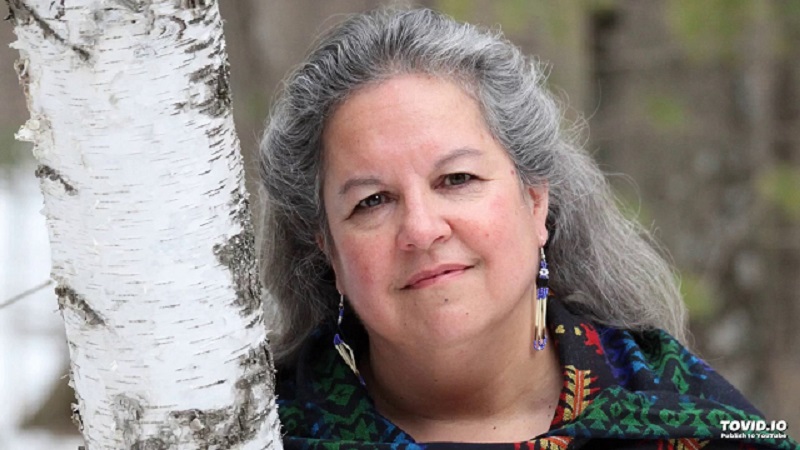Featured image: Robin Wall Kimmerer
by Purple Sage
Here is an interview with Derrick Jensen and Robin Wall Kimmerer about gratitude. The excerpt that caught my attention and made me want to read more was this:
“And when we really practice gratitude, it brings forth a sense of enoughness and sufficiency, I think. It makes you feel rich when you’re grateful. You think “Oh my gosh!” You enumerate all these gifts that are around you. And I think in a sense there are practical consequences of that emotion of gratitude; they are that we take less. And when we look at climate change, when we look at the biodiversity crisis, we all know that that is, in a linear way, related to our own consumption. And so if gratitude can be a control or a restraint over our own consumption, gratitude then becomes a really powerful tool for caretaking, for the earth. And so that’s one of the things, I think, that the earth asks of us, is gratitude.”
Kimmerer describes the relationship we should have with the natural environment in terms of gratitude—viewing the things the earth gives us as gifts with intrinsic worth, rather than “resources” to be bought and sold. This perspective is incredibly important and I think that viewing the world this way is necessary for our survival.
I love the way she sees the natural world and I love how she explains greed in terms of a lack of gratitude. Some people turn their whole lives into an endless pursuit of material things, and this vice has gotten out of control to the point where it’s killing our whole planet. What these people need is to really experience the intrinsic value of what they have, instead of trying to always have more. I think the reason they keep wanting more is because they have failed to feel grateful for what they already had.
Kimmerer says this about the importance of paying attention:
“And I think that one of the first places that I always start, especially with my students, is with attention. That in a world that gives us redwoods and mosses and salamanders, we should at least be paying attention to all of those beings and gifts, and to the fact that our lives are utterly dependent on them. And that kind of paying attention is what I think’s needed to bring us to a place of feeling that we live in a world made of gifts, rather than a world made of natural resources.”
Recently I wrote a post about spirituality in which I explained that my personal sense of spirituality is related to the ability to feel awe. I think this is a similar thing that Kimmerer is saying—we need to pay attention to and appreciate the intrinsic value of the things around us, and with this attitude, we realize we are constantly surrounded by gifts.
The way you can feel awe about something is to sit still and focus on the experience of that thing. When I took a mindfulness course, I realized that absolutely everything can be awesome, if I really allow myself to experience it. We did an exercise where we ate a raisin mindfully, and it’s amazing how a simple exercise can be so impactful. I was able to be mindful of the whole experience of holding a box of raisins in my hand and watching my hand as it opened the box, and then I took the time to notice the taste in my mouth instead of just swallowing it right away, and I figured it out—I understood what mindfulness feels like. It wasn’t about the raisin, of course, it was about learning how to pay attention. I actually noticed that day how complex the human hand is, and how not only is it complex how the fingers work to perform tasks, but we can do all sorts of complex things automatically, without our conscious mind even getting involved. I had a good cry that day over the miracle that is my hand, and that exercise really enhanced my ability to see what could be called “miracles” or “gifts” around me. The main things that keep me out of despair are gratitude and awe. Feeling this way has done wonders for my mental health.
To see someone taking this concept and applying it to how to deal with climate change was just beautiful and amazing. I recommend reading or listening to the whole interview—every bit of it is fantastic and important. (Here’s that link again!) This is a concept we have to understand in order to build a sense of spirituality and to understand how to save the world.
The reason this interview was brought to my attention is because our dear comrade Miep has been transcribing interviews that Derrick Jensen does on his show Resistance Radio. Thank you so much Miep—I love the gifts you bring to me!


Thank you for sharing this!
All the hearts.
Great analysis and excerpt, thank you Purple Sage.